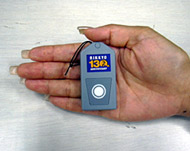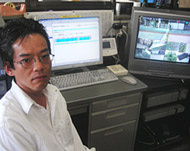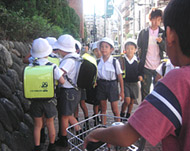Hi-tech tag eases school security woes
Little Hiro is one of the 40 or so pupils taking part in a unique security system experiment at Rikkyo Primary School in central Tokyo.

When Hiro arrives at school, his mother knows about it. And when he leaves school for the day, she knows about that too. She is not there to see it, and it is not mother’s intuition either.
At Rikkyo Primary School, which is privately run, a group of 40 grade four students (aged 10) have agreed to take part in an active RFID (radio frequency identification) tagging experiment, launched in the first week of October.
Co-devised by the school and technical giant Fujitsu Ltd, the tags, which measure 6cm by 3cm, are designed to be carried in a student’s bag or pocket.
 |
|
The device works on the principle |
The device emits a weak radio signal (lower in frequency than a television, and therefore harmless) which can be read by scanners from up to 10 metres away, in this case antennas on the school gate.
This enables a student’s movements to be registered, but without actually requiring any input from the individual student.
Information posted
The readings are then sent via a security camera, which also provides visual evidence of the child’s movements, to a central computer.
The computer then sends an email to each pupil’s parents, informing them of the exact time of their child’s arrival or departure as well as posting the information on a secure website, which can be accessed by both parents and school staff.
|
“More than 70% of parents supported the trials, indicating there |
As well as recording the movements of all tagged school members, the system will also ensure that should any unauthorised people try to access the school, the security system will immediately be alerted.
If necessary, the system could also be used to relay urgent messages to parents, such as in the event of an accident or earthquake. Providing the experiment proves successful, by April 2005 all students and staff will be required to carry technical tracking devices.
Going very well
Ishii Teruyoshi, a teacher at Rikkyo Primary School’s computer department, was a part of the core development team. He worked with Fujitsu engineers to devise the scheme.
According to him, one week into the programme the experiment is going very well. “The parents love it, the kids love it. It’s going so well it’s almost scary,” he said.
 |
|
Teacher Ishii Teruyoshi: Parents |
About 200 miles west of Tokyo, in Iwamura, in Gifu prefecture, a similar scheme has also been introduced by the Municipal Iwamura Elementary School.
Seventy-two children and their parents agreed to take part in the trial sponsored by Kyodo Printing Co and VR Techno, a private-public venture which has been backed in part by Kakamigahara municipal government.
Tags carried by the children register their movements between four different points between the school gates and home.
At the Municipal Iwamura Elementary School, too, the project has been met with approval: “More than 70% of parents supported the trials, indicating there is wide appreciation for this kind of effort,” Ichiro Ishihara, a teacher at the school told the Associated Press. “And the kids love it – they think it’s cool.”
Variety of uses
Nor is that all. The Asahi Shimbun daily reported recently that a similar scheme is due to be launched at a juku (privately run cram schools where students often finish very late at night) in Hiroshima prefecture this month. No doubt others will follow.
 |
|
Active RFID tags enable parents |
Active RFID tags are not new of course: there is uncertainty as to whether the device was first invented by the Russians or the British, but it was certainly used in the UK during World War II to distinguish homecoming planes from German ones.
Since then, RFID tags have been put to a variety of uses, from tagging livestock and pets to credit cards and electronic road toll collection.
In Mexico, the attorney general’s lawyers are tagged in case of kidnapping, and in the US, RFID tags have been used in several states to discourage prison inmates from attempting to escape.
But Tokyo’s Rikkyo Primary School’s use of the system on children is perhaps among the first in the history of RFID.
Still, is it just a passing fad or is there a genuine unmet need for the technology?
Security solution
For schools such as Rikkyo Primary, security has long been an issue. “We take school security very seriously and already employ security cameras and have guards posted on school grounds 24 hours a day,” principal Tsukasa Tanaka said.
|
“We take school security very seriously and already employ security cameras and have guards posted on school grounds 24 hours a day” Tsukasa Tanaka, |
There are many in Japan who would not think he was overreacting: recent surveys show a huge increase in anxiety regarding crime, with around half the population believing that Japan is no longer a safe place.
Admittedly, crime has reached record levels, but this is largely due to an increase in minor offences. But when it comes to violent crime, compared to many countries, Japan remains a remarkably safe place.
Surprisingly, considering the controversy that has dogged technical tagging around the world, the introduction of tags for children does not appear to have caused many ripples in the Japanese media.
Guidelines awaited
Fujitsu and Rikkyo Primary school are anxious to stress that there the RFID tags carry only a numbered code, recognised only by the school’s computer, and should a tag be lost or stolen, no personal information could be retrieved.
 |
|
Soaring crime levels are a major |
However, there are of course privacy issues with the tagging system as a whole. Tagging could, hypothetically, be set up to trace a child’s whereabouts outside of school. And while security and truancy are both issues that need to be addressed, the wider issue of protecting individual privacy is one that should not be ignored, many Japanese say.
According to the Asahi Shimbun, the ministry of internal affairs and communications, which so far only advises that children be fully informed about the uses of tracking devices before being issued with one, is working on guidelines regarding privacy and technical tagging.
If the schemes employed in Rikkyo Primary and Municipal Iwamura Elementary Schools continue to be a success, Japan is certainly going to need them.